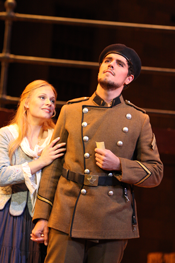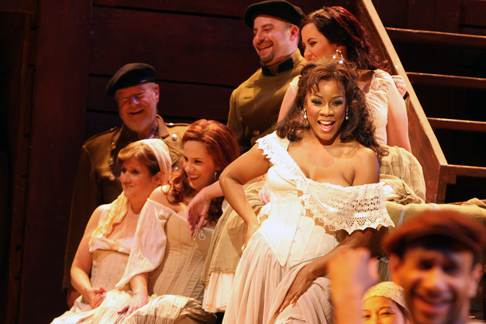![Denyce Graves as Carmen. [Photo by P. Switzer]](http://www.operatoday.com/Carmen_WNO_01.png)
01 Dec 2008
Carmen at the Washington National Opera
From the director’s point of view, there are two ways to approach staging an opera.
English Touring Opera are delighted to announce a season of lyric monodramas to tour nationally from October to December. The season features music for solo singer and piano by Argento, Britten, Tippett and Shostakovich with a bold and inventive approach to making opera during social distancing.
This tenth of ten Live from London concerts was in fact a recorded live performance from California. It was no less enjoyable for that, and it was also uplifting to learn that this wasn’t in fact the ‘last’ LfL event that we will be able to enjoy, courtesy of VOCES8 and their fellow vocal ensembles (more below …).
Ever since Wigmore Hall announced their superb series of autumn concerts, all streamed live and available free of charge, I’d been looking forward to this song recital by Ian Bostridge and Imogen Cooper.
The Sixteen continues its exploration of Henry Purcell’s Welcome Songs for Charles II. As with Robert King’s pioneering Purcell series begun over thirty years ago for Hyperion, Harry Christophers is recording two Welcome Songs per disc.
Although Stile Antico’s programme article for their Live from London recital introduced their selection from the many treasures of the English Renaissance in the context of the theological debates and upheavals of the Tudor and Elizabethan years, their performance was more evocative of private chamber music than of public liturgy.
In February this year, Albanian soprano Ermonela Jaho made a highly lauded debut recital at Wigmore Hall - a concert which both celebrated Opera Rara’s 50th anniversary and honoured the career of the Italian soprano Rosina Storchio (1872-1945), the star of verismo who created the title roles in Leoncavallo’s La bohème and Zazà, Mascagni’s Lodoletta and Puccini’s Madama Butterfly.
Evidently, face masks don’t stifle appreciative “Bravo!”s. And, reducing audience numbers doesn’t lower the volume of such acclamations. For, the audience at Wigmore Hall gave soprano Elizabeth Llewellyn and pianist Simon Lepper a greatly deserved warm reception and hearty response following this lunchtime recital of late-Romantic song.
Collapsology. Or, perhaps we should use the French word ‘Collapsologie’ because this is a transdisciplinary idea pretty much advocated by a series of French theorists - and apparently, mostly French theorists. It in essence focuses on the imminent collapse of modern society and all its layers - a series of escalating crises on a global scale: environmental, economic, geopolitical, governmental; the list is extensive.
For this week’s Live from London vocal recital we moved from the home of VOCES8, St Anne and St Agnes in the City of London, to Kings Place, where The Sixteen - who have been associate artists at the venue for some time - presented a programme of music and words bound together by the theme of ‘reflection’.
'Such is your divine Disposation that both you excellently understand, and royally entertaine the Exercise of Musicke.’
Amongst an avalanche of new Mahler recordings appearing at the moment (Das Lied von der Erde seems to be the most favoured, with three) this 1991 Mahler Second from the 2nd Kassel MahlerFest is one of the more interesting releases.
‘And there was war in heaven: Michael and his angels fought against the dragon; and the dragon fought and his angels, And prevailed not; neither was their place found any more in heaven … that old serpent … Satan, which deceiveth the whole world: he was cast out into the earth, and his angels were cast out with him.’
If there is one myth, it seems believed by some people today, that probably needs shattering it is that post-war recordings or performances of Wagner operas were always of exceptional quality. This 1949 Hamburg Tristan und Isolde is one of those recordings - though quite who is to blame for its many problems takes quite some unearthing.
There was never any doubt that the fifth of the twelve Met Stars Live in Concert broadcasts was going to be a palpably intense and vivid event, as well as a musically stunning and theatrically enervating experience.
‘Love’ was the theme for this Live from London performance by Apollo5. Given the complexity and diversity of that human emotion, and Apollo5’s reputation for versatility and diverse repertoire, ranging from Renaissance choral music to jazz, from contemporary classical works to popular song, it was no surprise that their programme spanned 500 years and several musical styles.
The Academy of St Martin in the Fields have titled their autumn series of eight concerts - which are taking place at 5pm and 7.30pm on two Saturdays each month at their home venue in Trafalgar Square, and being filmed for streaming the following Thursday - ‘re:connect’.
The London Symphony Orchestra opened their Autumn 2020 season with a homage to Oliver Knussen, who died at the age of 66 in July 2018. The programme traced a national musical lineage through the twentieth century, from Britten to Knussen, on to Mark-Anthony Turnage, and entwining the LSO and Rattle too.
With the Live from London digital vocal festival entering the second half of the series, the festival’s host, VOCES8, returned to their home at St Annes and St Agnes in the City of London to present a sequence of ‘Choral Dances’ - vocal music inspired by dance, embracing diverse genres from the Renaissance madrigal to swing jazz.
Just a few unison string wriggles from the opening of Mozart’s overture to Le nozze di Figaro are enough to make any opera-lover perch on the edge of their seat, in excited anticipation of the drama in music to come, so there could be no other curtain-raiser for this Gala Concert at the Royal Opera House, the latest instalment from ‘their House’ to ‘our houses’.
"Before the ending of the day, creator of all things, we pray that, with your accustomed mercy, you may watch over us."
![Denyce Graves as Carmen. [Photo by P. Switzer]](http://www.operatoday.com/Carmen_WNO_01.png)
From the director’s point of view, there are two ways to approach staging an opera.
It can be an ensemble work, with the main roles given relatively equal weight, and interaction between the characters central to plot development. An opera production can also be a star vehicle, in which a single principal (or more rarely, a pair of leads) carries the performance, while the rest of the cast plays supporting roles that sets off the drama of the “stars.” Some operas may be conceptualized either way, while others lend themselves naturally to one staging type or another: La bohème, for instance, works best as an ensemble piece, while Boris Godunov, particularly in its 1869 version, revolves around its protagonist. Arguably, so does Carmen whose femme fatale heroine writes not only her own tragic fate, but those of at least two other principals, Don José and Micaëla (the self-involved matador Escamillo will probably get over her death soon enough).
 Sabina Cvilak as Micaela, Thiago Arancam as Don Jose. [Photo by Karin Cooper]
Sabina Cvilak as Micaela, Thiago Arancam as Don Jose. [Photo by Karin Cooper]
The absolute necessity of mezzo star power for a successful Carmen has once again been demonstrated by the Washington National Opera’s current production of Bizet’s classic. The fabulous DC native Denyce Graves completely dominated on stage as the seductive gypsy, with both her colleagues and the audience content to let her rule not only Don José’s heart, but also Georges Bizet’s score. Ms Graves allowed herself quite a few liberties in text projection, pitches, and timing of her part. Yet somehow, even the most fastidious purist would not have minded such an open desire for “liberty,” to quote the lady herself. She was utterly convincing in her interpretation; and if the locals saw more a fast-talking broad from South-East DC than a factory girl from the gutters of Seville, well, so much the better. Of much help were the gorgeous reds and oranges of Lennart Mark’s flamenco-inspired costumes, and the percussion section of the orchestra, which thankfully did not follow Ms Graves’s pliable relationship with time, and accompanied her dancing tastefully and precisely. Most importantly, to the singer’s credit, she has crafted her heroine’s image beautifully, knowing when to seize the limelight and when to fade into the background. The Act 2 quintet turned out to be one of the most successful moments in the production precisely because Ms Graves stepped back and blended with the ensemble. Yet later in the scene, her pitch-perfect, richly textured call “Amour…,” thrown to Escamillo from across the stage, turned not only the matador’s head, but everyone else’s in the building.
 Denyce Graves as Carmen with WNO Chorus. [Photo by Karin Cooper]
Denyce Graves as Carmen with WNO Chorus. [Photo by Karin Cooper]
Of course, with Denyce Graves, acclaimed as “the definitive Carmen,” on the playbill, a powerful protagonist in this WNO production was to be expected. More unusual was the fact that the sentimental lyrical soprano Micaëla, traditionally the weakest link in Bizet’s quartet of leads, almost managed to stand up to her rival. This thanks to Sabina Cvilak’s convincing performance, still a little shaky in Act 1, but seemingly having grown with her heroine toward a strong, powerful Act 3 finale. The men of the cast, on the other hand, were almost invariably unimpressive. Not that they did not try to make their mark. Both Thiago Arancam as José and Jorge Lagunes as Escamillo struck the right poses and delivered their high notes with panache; the Flower aria turned out quite well as a result, the torero’s infamous couplets rather less so. For the most part, however, the two male leads sounded weak and much too easily dominated by their ladies. Carmen’s derisive laugh moments before her demise seemed therefore right on target - John Marcus Bindel as Zuniga, and hilarious James Shaffran and Peter Burroughs as Le Dancaire and Le Remendado respectively all left her poor tenor in the dust… The solid support cast and the girl power, however, were enough to ensure a quality production and an enjoyable evening of “all about Carmen.”
Olga Haldey